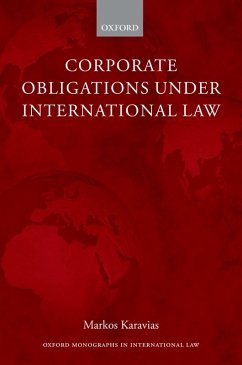This book examines the extent to which international law places obligations directly on corporate entities. It is often argued that corporations are bound by, inter alia, the same human rights and environmental obligations that states have. This book examines the source of these supposed obligations in treaty law, international custom, and in internationalized contracts, to determine whether they really can be transposed to corporations so easily. The focus of the book is on the regulation by international law of private corporate conduct. It examines whether corporate obligations, namely obligations binding directly upon a corporation under positive international law, have indeed emerged, and if so, whether corporations may be systemically included in the predominantly state-centric framework of international law. It investigates the challenges facing international law as a result of the potential emergence of corporate obligations, and engages in a structural analysis of what corporate obligations under international human rights law might entail. Ultimately, it warns against conceptualizing corporations as both holders and potential violators of human rights, explaining why they are not automatically bound by the same obligations that are imposed on states.
Dieser Download kann aus rechtlichen Gründen nur mit Rechnungsadresse in A, B, BG, CY, CZ, D, DK, EW, E, FIN, F, GR, HR, H, IRL, I, LT, L, LR, M, NL, PL, P, R, S, SLO, SK ausgeliefert werden.


